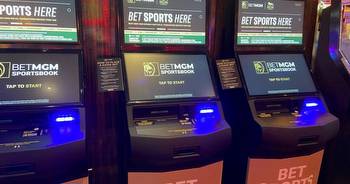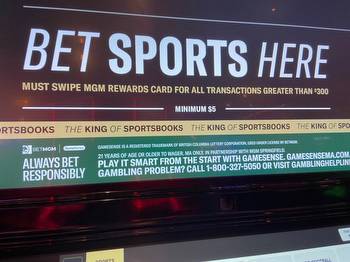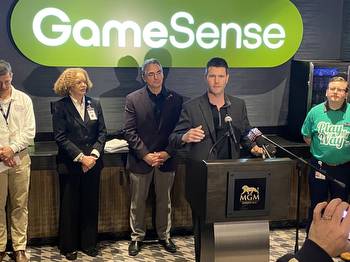Gaming Commission weighs regulating intensity, frequency of casino ads

Before the state's first resort casino even opened its doors, there was a "significant increase" in the number of people with gambling problems who relapsed in Massachusetts, and the Gaming Commission highlighted that situation Monday, as it began to consider updates to its rules around gambling and betting advertising.
Until MGM Springfield opened Aug. 24, 2018, the only legal betting option for Massachusetts gamblers was the Plainridge Park Casino slots parlor in Plainville. But, the planned opening of MGM — it was the first Las Vegas-style resort casino to open since Massachusetts legalized casino gaming in 2011 — was all over the news in summer 2018, and Gaming Commission researchers said that publicity was harmful to people with gambling problems, who are more likely than nongamblers to be influenced by gambling promotions and advertisements.
"That increased publicity and media attention about gambling aligned with those elevated rates of problem gambling, indicating that those relapses in problem gambling were not likely due to the physical availability to gamble — because the casino was not open — but rather due to the increased publicity and media attention in advance of the opening of the casino," Research Manager Marie-Claire Flores Pajot said, referencing a finding of a six-year study of problem gambling in Massachusetts.
As they prepare for the possibility that they are tasked with regulating sports betting, the members of the Massachusetts Gaming Commission have signaled a serious interest in getting a handle on the industry's advertising practices, which have been criticized as overly saturating and irresponsible.
Commissioners showed an interest in exploring regulations, many of which could overlap with existing regulations on casino gaming advertising, that could help protect problem gamblers, people younger than 21 and demographic groups found to be particularly at risk of experiencing gambling-related problems in Massachusetts, including men and people in lower-income groups.
"What I'm excited about is that we're engaging this conversation. I had thought that this was somewhat overdue," Chairwoman Cathy Judd-Stein said. "And I think with Commissioner [Brad] Hill's arrival, you and I both recognize that at least with respect to sports betting, we were seeing such a proliferation of advertising that this was probably a good time to truly revisit — it had been looked at in the past — but to look at it through even a new lens since 2014 and in the next few years."
The commission's research team presented a white paper that covered the current regulations for gambling advertising in Massachusetts and other states, an overview of research related to problem gambling and advertising, and a litany of additional strategies or measures that commissioners could consider.
"Advertising to sell a product or services is nothing new. In recent years, however, advertising practices have become especially pervasive; it's no longer television commercials, billboards and newspaper ads. Advertising today utilizes user-specific data collected through social media and other means to push out highly targeted ads through our smartphones and other screens," said Mark Vander Linden, the commission's director of research and responsible gaming.
"On the surface, it appears this is the free market at play. But, gambling is not a risk-free activity, and therefore commissioners may wish to consider additional measures to limit and/or contain gambling advertising in Massachusetts by our licensees and their parent companies in order to minimize harm."
The state's three gaming licensees already are prohibited from targeting anyone younger than 21 with their ads or messaging and from marketing to anyone who has put themselves on the commission's voluntary self-exclusion list. Also, marketing or promotional materials must include information on seeking help with a gambling problem.
The commission also has adopted a responsible gaming framework that says Massachusetts casinos "should develop and implement strategies to ensure advertising and promotions are delivered in a responsible manner ... including messaging related to promoting positive play and advertising problem gambling help resources."
The white paper suggested additional measures: prohibiting advertising that is "placed with such intensity and frequency that it saturates that communication medium, or in some cases, location;" requiring that a portion of each licensee's marketing and advertising budget be dedicated to responsible gaming messaging; establishing a process through which advertising violations could be reported; requiring mandatory training for casino officials involved in advertising and marketing; and conducting more research on the impact that gambling advertising has on Massachusetts residents.
One recommendation that caught the attention of multiple commissioners was adopting a restriction for gambling ads similar to what the Cannabis Control Commission has in place for marijuana companies.
Under that model, gambling operators would be prohibited from advertising on television, radio, the internet, mobile applications, social media, other electronic communications, billboards, other outdoor advertising, or in print publications unless at least 85 percent of the audience is "reasonably expected" to be 21 years of age or older based on audience composition data. For marijuana companies, that has meant a focus on billboards and digital media like podcasts.
"I would love for us to look deeply at the cannabis commission," Judd-Stein said. "They're in Massachusetts, they know how we roll in Massachusetts. So, I like looking at their regs, and I'm particularly interested in — well, I think it was a few who pointed out — the fourth prohibition on advertising and around the issue around the 85 percent of the audience."
It is not just the content of the ads that the Gaming Commission is interested in, but also the ubiquity of the ads.
"I think I'm most concerned right now — and I suspect it is because the rollout of sports betting — is the frequency or intensity of distribution of advertising, the prevalence," Judd-Stein said. "The content may be just fine, right? It may be fine. But, if it's just hitting us, hitting us ... and then of course, should sports betting be legalized in Massachusetts, that prevalence will become just a very significant matter."
In 2015, it was the ubiquity of the ads for DraftKings and FanDuel on television, the internet and at public places like South Station that helped daily fantasy sports break into the mainstream. But, it also put the activity onto regulators' radar screens and led them to impose restrictions on it. A review of DraftKings and the industry in general launched by Attorney General Maura Healey eventually led to penalties for DraftKings and FanDuel, and consumer protection regulations for daily fantasy sports.
Similarly, it was the constant presence of advertising for DraftKings during last fall's Major League Baseball playoffs that caught Hill's attention and caused him to raise the subject during a commission meeting.
"And they pushed it and pushed it and pushed it, every single inning that we watched of the game last night," Hill said in October of the betting ads.
The Gaming Commission on Monday took no action related to advertising, but it agreed with Vander Linden that it should accept public input on the white paper. A public comment period, likely longer than two weeks in duration, is expected to be the next step as the Gaming Commission prepares for the potential that sports betting is made legal in the Bay State.



































